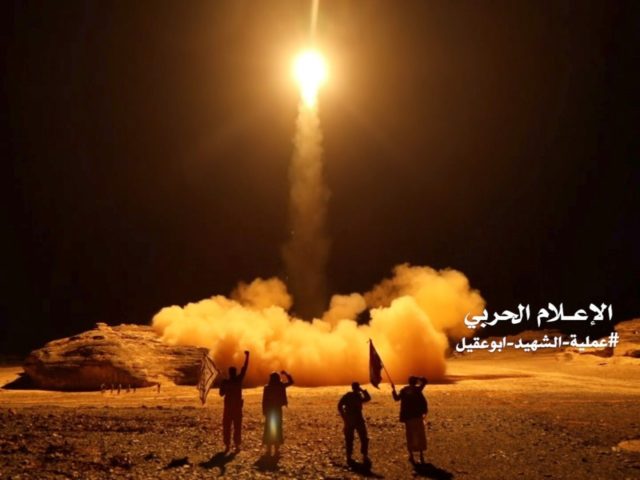The internationally recognized Yemeni military reportedly revealed America’s most advanced defense system in the hands of Saudi Arabia failed to intercept a cruise missile fired by Iran-aligned Shiite Houthi rebels at a civilian airport in the Sunni kingdom this week.
The missile injured 25 people, including women and children.
Both Iran and its narco-terrorist proxy Hezbollah, based out of Lebanon, have provided assistance to the Shiite Houthis in their offensive against the Saudi and Emirati-led coalition fighting to restore the internationally-recognized government of Yemeni President Abd-Rabbu Mansour Hadi with the help of the United States.
On Wednesday, the day of the attack, Brig. Gen. Yahya Saree, a spokesman for the Yemeni armed forces, revealed the cruise missile fired at Saudi Arabia’s Abha airport, located close to the Houthi-controlled portion of the Yemen-Saudi Arabia border, was a winged rocket that accurately struck its target.
“Thank God, the missile directly hit the observation tower in the airport causing it to be out of service and leading to [the] suspension of flights there,” Gen. Saree reportedly declared, according to the Al Manar TV channel — affiliated with Iran’s narco-terrorist proxy Hezbollah.
“U.S.’ most advanced defense system could not intercept the missile which caused fear and confusion in the enemy’s ranks,” he added, echoing a spokesman for the Houthi rebels.
“The most modern American systems could not intercept the missile,” he boasted in comments carried by the group’s media center, according to Reuters.
Jeremy Binnie, the Middle East & Africa editor of Jane’s Defense Weekly, told Reuters that the closest Patriot battery to Abha is about 12 miles north.
“A cruise missile might be able to come in at a sufficiently low altitude that it could not be engaged before reaching its target,” he said.
Members of the Saudi and Emirati-led Sunni coalition who have been fighting the Iranian-backed Shiite Houthis since March 2015 indicated that the attack on the civilian airport could amount to a war crime.
Reuters reported:
A [Saudi and Emirati-led] coalition statement said a projectile hit the arrivals hall at Abha airport, causing material damage. Three women and two children were among the wounded, who were of Saudi, Yemeni and Indian nationalities.
…The Houthis said on their media channels that they had fired a cruise missile at Abha airport, which is about 200 km (125 miles) north of the Yemen border and serves domestic and regional routes.
The Saudi and Emirati alliance vowed to take “urgent and timely” measures in response to the attack.
According to the Gen. Saree, the missile attack on Abha came in retaliation for the Saudi-led coalitions’ crimes against the Yemeni people.
“This attack also proves this terrorist [Houthi] militia’s acquisition of new special weapons; the continuation of the Iranian regime’s support and practice of cross-border terrorism,” the Sunni coalition declared in a statement, Reuters reported, noting that Iran did not immediately respond to the accusations.
The Houthis deny receiving assistance from Iran and Hezbollah.
Since March 2015, a Saudi and Emirati-led coalition backed by the United States has been fighting to defeat the Houthis.
Both Tehran and the Shiite rebels deny receiving military assistance from U.S.-designated state-sponsor of terror Iran in the form of military weapons and equipment, including missiles.
The U.S. government, however, has presented evidence to the contrary.
Houthi rebels have repeatedly fired missiles and rockets into Saudi Arabia.
Some news outlets claim that the Houthis who control vast areas in an around the Yemeni capital Sanaa, including territory along the Saudi border, have conquered territory inside the Sunni kingdom.
Wednesday’s missile attack targeted the Saudi airport of Abha, located close to Houthi-held territory. Abha sits just north of the city of Jizan, which is within the 100 square mile strip of kingdom territory that the New Khalij newspaper reported in January 2018 to be controlled by the Shiite rebels.
The Saudi-led Sunni coalition pledged to “respond firmly” to the missile attack by the Shiite Houthis.
Saudi Arabia blamed the attack on Iran’s military support for the Houthis.
The intensified violence in Yemen could threaten the fragile United Nations-led ceasefire in the country’s main port city of Hodeida, considered the lifeline for millions of Yemenis since it handles the imports on which the country primarily relies.

COMMENTS
Please let us know if you're having issues with commenting.